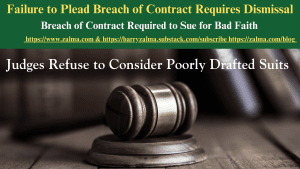Failure to Plead Breach of Contract Requires Dismissal

Post 4975
See the full video at https://rumble.com/v6ac0h1-failure-to-plead-breach-of-contract-requires-dismissal.html and at https://youtu.be/I0E9RMD9egU
Foremost Insurance Company Grand Rapids, Michigan (“Foremost”) moved the court to dismiss in C & S Properties – I, LLC v. Foremost Insurance Company Grand Rapids, Michigan, Civil Action No. 24-462, United States District Court, E.D. Louisiana (January 10, 2025)
FACTUAL BACKGROUND
Damages from Hurricane Ida caused insurance claims concerning three properties owned by Plaintiff. The properties were each covered by separate insurance policies issued by Foremost when they were damaged by Hurricane Ida in August 2021.
Plaintiff alleged that, while Foremost has been in possession of sufficient evidence of the losses or had the opportunity to fully apprise itself of the actual losses and damages, it has failed to pay the amount due under the policies required by Louisiana law.
Plaintiff sued Foremost in Louisiana state court asserting claims under Louisiana law for breach of contract and bad faith damages. Foremost removed the matter to the USDC on the basis of diversity jurisdiction.
Foremost moved to Dismiss Plaintiff’s claims based upon the improper cumulation of claims and because the suit did not state a claim for which relief can be granted.
LEGAL STANDARD
Joining Claims
Federal Rule of Civil Procedure 18 provides that, “[a] party asserting a claim . . . may join, as independent or alternative claims, as many claims as it has against an opposing party.”
Under Federal Rule of Civil Procedure 12(b)(6), a defendant can seek dismissal of a complaint, or any part of it, for failure to state a claim upon which relief may be granted. To survive a Rule 12(b)(6) motion to dismiss, “a complaint must contain sufficient factual matter, accepted as true, to ‘state a claim to relief that is plausible on its face.’”
Dismissal is appropriate when the complaint on its face shows a bar to relief.
ANALYSIS
Regarding the insurance policies attached by Foremost, the Court found that those are referenced in Plaintiff’s state court Petition and are central to Plaintiff’s claims and thus may be rightfully considered by the Court.
Cumulation of Claims
The Court found that Plaintiff properly included its claims concerning each of the three properties in one lawsuit pursuant to Fed.R.Civ.P. 18(a).
Failure to State a Claim
The allegations in the Petition are insufficient to support a breach of contract claim. The Petition contains only vague and conclusory allegations and does not refer to specific actions or omissions by Foremost.
Plaintiff alleged that Hurricane Ida caused substantial amounts of damage to the exterior, interior, roof, and other structures of the Insured Properties, that Plaintiff provided timely notice of the loss event to Defendant. The Court found that Plaintiff’s Petition failed to state a breach of contract claim against Foremost.
The Court reached the same conclusion with respect to Plaintiff’s bad faith claim. The Petition merely sets forth the legal standard applicable to Louisiana bad faith claims, without providing factual support for Plaintiff’s allegations that Foremost acted in bad faith.
Leave to Amend
In its Opposition brief, Plaintiff requested leave to amend its Petition if the Court agrees with Foremost that the Petition is deficient.
While Plaintiff has failed to explain how it would amend its Petition Plaintiff shall have fourteen (14) days to file an amended petition addressing the deficiencies raised as to the sufficiency of its breach of contract and bad faith claims.
The Motion to Dismiss Pursuant to Federal Rule 12 was granted.
Plaintiff was granted fourteen (14) days from the date of this Order to file an amended pleading that addresses the deficiencies raised in the Motion to Dismiss regarding the sufficiency of its breach of contract and bad faith claims. Failure to amend will result in dismissal.
The USDC requires proper, detailed and effective pleading when suing for breach of contract or the tort of bad faith, not just a parade of horribles alleged against the defendant with the statutory requirements without supportive facts. The USDC spend much of its opinion explaining to the Plaintiff what is required to plead a viable complaint against Foremost if the facts exist.
 (c) 2025 Barry Zalma & ClaimSchool, Inc.
(c) 2025 Barry Zalma & ClaimSchool, Inc.
Please tell your friends and colleagues about this blog and the videos and let them subscribe to the blog and the videos.
Subscribe to my substack at https://barryzalma.substack.com/subscribe
Go to X @bzalma; Go to Newsbreak.com https://www.newsbreak.com/@c/1653419?s=01; Go to Barry Zalma videos at Rumble.com at https://rumble.com/account/content?type=all; Go to Barry Zalma on YouTube- https://www.youtube.com/channel/UCysiZklEtxZsSF9DfC0Expg
Go to the Insurance Claims Library – https://lnkd.in/gwEYk
Like this:
Loading…
Related
About Barry Zalma
An insurance coverage and claims handling author, consultant and expert witness with more than 48 years of practical and court room experience.



